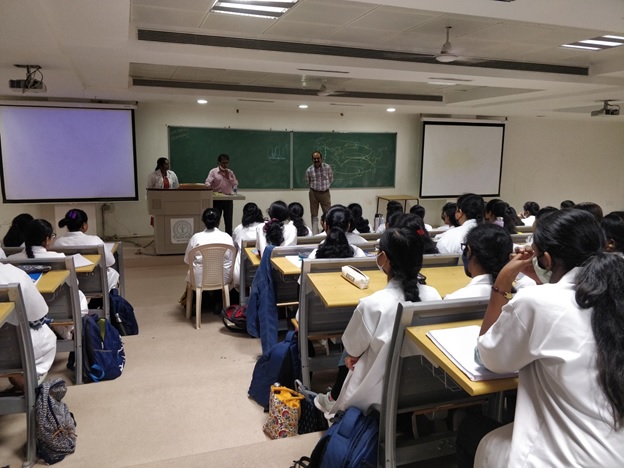
History of the department:
The word chemistry is derived from the Greek word "chemi" (the black land), the ancient name of Egypt. Indian medical science, even from ancient times, had identified the metabolic and genetic basis of diseases. The term "Biochemistry" was coined by Neuberg in 1903 from Greek words, bios (= life) and chymos (= juice). Biochemistry is closely related to molecular biology, the study of the molecular mechanisms of biological phenomena. Biochemistry is perhaps the most rapidly developing discipline in medicine. No wonder, the major share of Nobel prizes in medicine has gone to research workers engaged in biochemistry. The findings of biochemistry are applied primarily in medicine, nutrition, and agriculture. In medicine, biochemists investigate the causes and cures of diseases. In nutrition, they study how to maintain health wellness and study the effects of nutritional deficiencies.
Modern day medical practice is highly dependent on the laboratory analysis of body fluids, especially the blood. The disease manifestations are reflected in the composition of blood and other tissues. Hence, the demarcation of abnormal from normal constituents of the body is another aim of the study of biochemistry.
In 2019 we successfully faced PG seats assessment and now it is a post graduate department with 3 seats, opening gates for further milestones.With completion of NABL audit, expecting accreditation.
Vision
To excel in the field of medical biochemistry and to be recognized as the best in Teaching, Research and also in providing Quality Laboratory service to patients.
Mission
- To impart quality teaching and training in biochemistry to the students.
- To make students realize the importance of biochemistry as the basis of Medicine.
- To constantly upgrade the clinical laboratory by having state of the art equipments.
- To impart excellent patient care by reliable clinical laboratory results.
- To promote research activities in the department.
Objectives:
- To train the undergraduate and postgraduate medical students and research scholars in academics, research and laboratory medicine.
- To organize integrated teaching for complete understanding of various concepts in medicine.
- To train postgraduates in teaching skills by encouraging to participate in UG teaching and presentation of papers.
- To conduct journal review meetings and critically analyze the original research.
- To train postgraduate students in techniques of laboratory medicine, clinical interpretation of laboratory findings and clinical case discussion.
- To organize CME, guest lectures, conference and workshops etc, to update students and faculty in recent biochemical concepts.
- To provide quality laboratory services to the society.
- To encourage and facilitate the students and faculty to actively participate in clinical research.
Details of Heads of the department:
| Sl.No | Name of the HODs | From | To |
| 1 | Dr. Jayaprakash Murthy | 2013 | June 2018 |
| 2 | Dr.Nagarajappa K | 29.06.2018 | Till Date |
Contact information:
Department mail ID: [email protected]
Contact number: +91-80-61854102 : exten; 183
7.DEPARTMENT FACULTY LIST Click Here
E- learning resourses:
Adequate E- Learning resources available at the Central Library.
Infrastructure :
Department of biochemistry being basic science department offers meticulously designed training methods in teaching theory and practical skills.
The department innovates constantly to teach students in the 1st year of MBBS course effectively so that it enables them to comprehend the relevance of biochemistry and apply them in their future work as health care professionals.
The committed, qualified and experienced faculty will provide academic support and also look after their career advancement and offer prompt feedback on their examination performance.
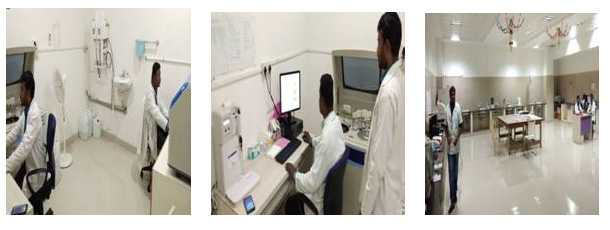
The Department involve students in research projects like ICMR and STS. They also encourage, motivate and prepare the students to participate and present research papers in conferences and quiz programmes.
The department has a spacious UG laboratory to accommodate 100 students having state of art, worktables and modern equipments. Demonstration rooms to accommodate 75 students are equipped with audiovisual aids which provide an excellent environment for active learning. The department also encompasses with a departmental library having a good collection of recommended and reference books of latest editions and a research laboratory equipped with sophisticated instruments providing a platform to excel in research activities.
A well designed clinical laboratory as a component of central laboratory in the hospital provides support to the clinicians by serving patients round the clock with the state of art facilities and ultra modern instruments.
The department’s clinical biochemistry section is equipped with fully automated analyzers, semi automated analyzers, electrolyte analyzers, arterial blood gas analyzers, fully automated Chemiluminescence analyzers etc to evaluate to organ profiles for the right diagnosis , monitor patient compliance and outcome of treatment.
The modern equipments for measuring levels of various substances in blood, body fluids like CSF, pleural, ascitic fluids and in urine are used. The following parameters like Glucose, urea, Creatinine, uric acid, lipid profile, serum electrolytes, LFT, calcium , Serum amylase, lipase, lactate Dehydrogenase, Glycosylated Hemoglobin, cardiac markers (CKMB and Troponin T) along with various hormones and tumour markers is measured. Regular quality control checks are performed on these equipments and we are also involved in external quality assurance programme conducted by CMC vellore to give reliable reports.
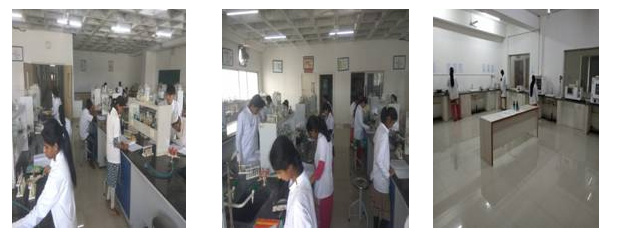
Biochemistry Department is well equipped with a Central research laboratory including Molecular Biology section, PG & UG practical halls, demonstration rooms, seminar hall, state of the- art Audio visual aids and a departmental library which has updated text books & reference books for the use of faculty, PG & UG students.
The department’s clinical Biochemistry section is equipped with fully automated analyzers, semi-automated analyzers, electrolyte analyzers, arterial blood gas analyzers, fully automated chemiluminescence analyzers for hormones, automated chemiluminescence analyzer, etc to evaluate organ profiles for the right diagnosis, monitor patient compliance and outcome of treatment.
The department has committed, qualified and experienced faculty who take well-prepared didactic lectures on all theory topics as prescribed by MCI. In addition, small group teaching, tutorials and integrated teaching are being conducted regularly and systematically. The faculty also encourages, motivate and prepare the students to participate and present research papers in conferences. Advance training is also imparted to post graduate students.
The faculty has many national and international publications to its credit and the department contributes immensely to the laboratory needs of the teaching hospital.
CME programmes and Activites:
Organized CME on 14th December 2018.
Topic: Diet and Diabetes
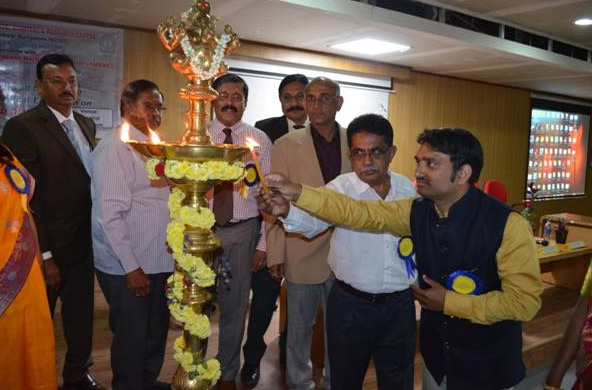

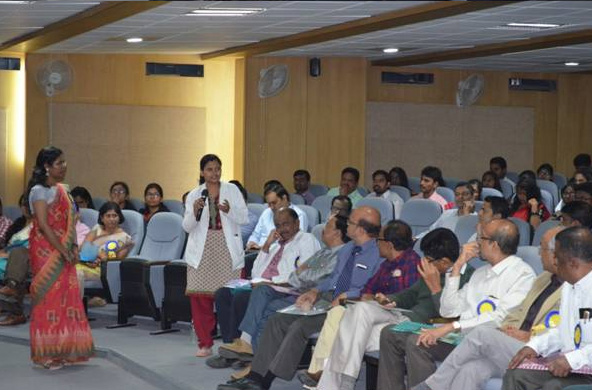

CME programmes and Activites:
Continued Medical Education on ‘UPDATES ON NEW BORN SCREENING’ 23rd January 2020
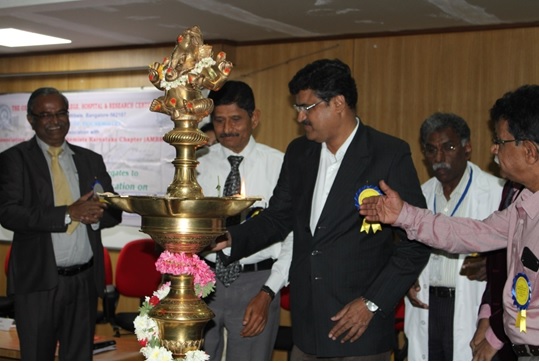
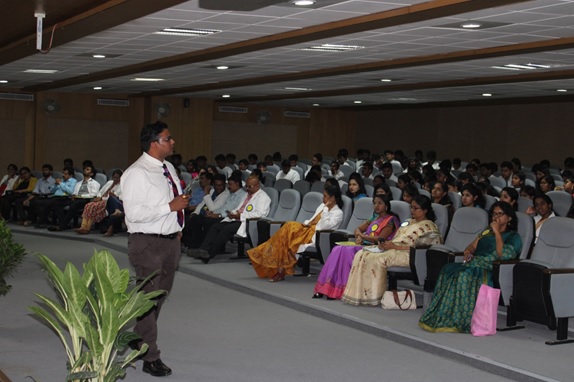
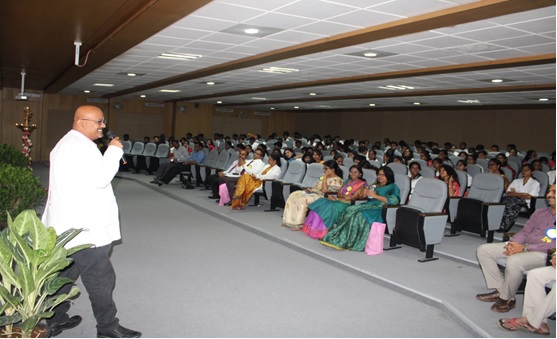

CME programmes and Activites:
Organized CME on 23rd September 2021
Topic : “Prevention to Intervention in cardiology’
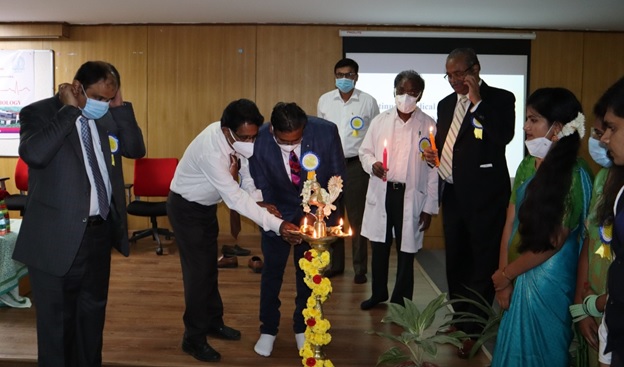

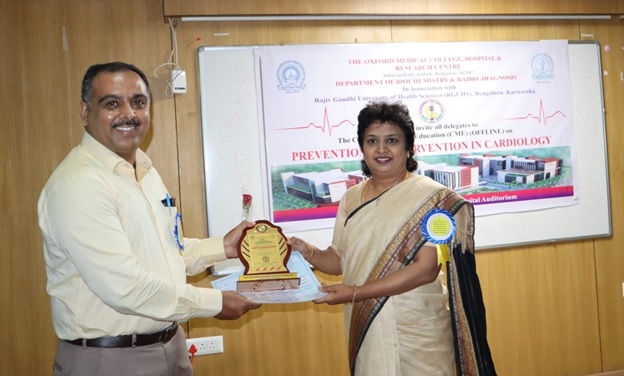
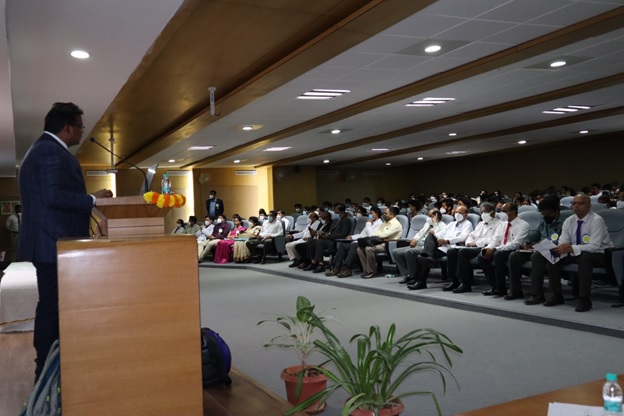

Awards Achievements and Publications
Publications:
Dr. Nagarajappa.K
- Nagarajappa K, Sushma BJ, Shweta RH. Study of thyroid stimulating hormone, serum creatinine and uric acid levels in patients with hypothyroidism. Int J Pure app Biosci 2014;2(2): 187-190.
- Sushma BJ, Nagarajappa K, Mallikarjuna CR. Serum paraoxonase-1 activity, oxidative stress & lipid profile in patients with chronic liver disease. Int j pharm bio sci. 2013;3(1):01-06.
- Sushma BJ, Nagarajappa K, Mallikarjuna CR. Serum ferritin a novel risk factor for diabetes ?
- Sushma BJ, Nagarajappa K, Shrikanth C.A study on association of thyroid stimulating hormone with BMI, insulin resistance and lipid profile in women with polycystic ovarian syndrome.IJMPR 2014;2(2);585-590.
- Nagarajappa K, Sushma BJ. Study of altered liver function tests and electrolyte disturbances in patients with dengue infections.IJUPBS 2013;2(3).
Dr.Vijayalakshmi
- Dr.Vijayalakshmi. P, Dr.Supriya. Altered levels of serum adenosine deaminase in type 2 diabetes mellitus. National Journal of laboratory medicine.2019,vol 8 (3);9-11.
- Dr.Vijayalakshmi. P, Dr.SMR Usha. Assessment of serum cystatin C and creatinine in monitoring preeclampsia. Journal of clinical and diagnostic research.2019,13 (6);12-15.
- Dr.Vijayalakshmi. P, Dr. SMR Usha.Study of Serum hsCRP and lipid profile in Pre-eclampsia, published in the International Journal of Recent trends in Science and Technology, Volume-14, 2015.
- Dr.Vijayalakshmi. PDr.Victoria.Study of hs-CRP and lipid profile in hypothyroid adults at tertiary care hospital International Journal of Clinical Biochemistry and Research 6 (2019) 303-310.
- Dr.Vijayalakshmi. P,DrManjula .Assessment of relationship between hormones and insulin resistance in PCOS. International Journal of Clinical Biochemistry and Research 2019;6(4):584—589.
ACHIEVEMENTS:
- Completed the training program on QMS & Internal Audit in Medical Laboratories as per ISO 15189: 2012.
- Presented Paper at National conference and State Conference (2015 and 2016).
- Certified Emergency comprehensive life support (ECLS and BLS)trainer.
- 10th rank holder in MD biochemistry RGUHS 2016.
- VaishaliKolgiri*1, Vidya Nagar2, V W Patil3. Association of serum total bilirubin and plasma 8-OH-dG in HIV/AIDS patients. Interventional Medicine & Applied Science. 10(2):76-82,2018. PubMed ID: 30363337 .
- VaishaliKolgiri*1, Vidhya Nagar2. V. W. Patil3.Association of metabolic syndrome and oxidative DNA damage in HIV/AIDS patients. Indian Journal of Clinical Biochemistry 2017;6:1-9 https://link.springer.com/article/10.1007/s12291-017-0670-5
- VaishaliKolgiri Honnapurmath∗1, V. W. Patil2. Antiretroviral therapy-induced insulin resistance and oxidative deoxy nucleic acid damage in human immunodeficiency virus-1 patients. Indian Journal of Endocrinology and Metabolism / Jan-Feb 2017 / Vol 21 Issue 1 https://www.ncbi.nlm.nih.gov/pmc/articles/PMC5367237/
- Vaishali Kolgiri1, Rajesh Rajekar*1, V. W. Patil2.Analysis of oxidative DNA damage in HIV-Positive pregnant women. International Journal of Innovative Research in Medical Sciences 2017;2:1378-82;http://ijirms.in/index.php/ijirms-issue/current-issue/ 370-analysis-of-oxidative-dna-damage-in-hiv-positive-pregnant-women
- Vaishali Kolgiri∗1, VinayakWamanrao Patil2. Protein carbonyl content: a novel biomarker for ageing in HIV/AIDS patients. Braz J Infect Dis 2016;21(1):35–41; https://www.ncbi.nlm.nih.gov/pubmed/27821249.
- Vaishali Kolgiri∗1, V. W. Patil2, Vidhya Nagar3.Correlation of total antioxidant status (TAS) with DNA Damage in HIV/AIDS patients. International Journal of Pharmacy and Pharmaceutical Sciences ISSN- 0975-1491 Vol 8, Issue 6, 2016. https://innovareacademics.in/journals/index.php/ijpps/article/view/11454/5369
- SomnathKolgiri, Rahul Hiremath, VaishaliKolgiri. Ergonomic analysis tools for power-loom Industry. Techno Societal: 2020; 623-636
- Completed the training program on QMS & Internal Audit in Medical Laboratories as per ISO 15189.2012
- Presented Paper at International conference (2021).
- Kumar PS, Vinapamula KS, Suchitra MM, Sachan A. Study on the association of Vitamin D with glycemic control in patients with type 2 diabetes mellitus. J ClinSci Res 2019;8:188-92.
- Merit certificate for the year 2018 among the students of all MSc. Medical courses. Guest Lectures:
Dr. VaishaliKolgiriHonnapurmath
PUBLICATIONS
Mr. Pasagadugula Santosh Kumar
1.Guest lecture organized by Department of Biochemistry on 11/03/2022 Topic: “Recent advances in Diabetes Mellitus “
By
Dr. Sushma B J
Professor & HOD
Department of Biochemistry
Prasad Institute of Medical Sciences,Lucknow



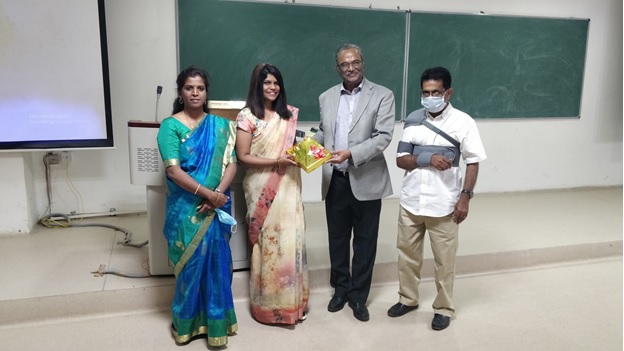
2. Guest lecture organized by Department of Biochemistry on 19/05/2022
Topic: “How to read; understand, Importance of Biochemistry in Medicine,
How to face RGUHS Biochemistry examination”
By
Dr. Shyam Prasad
Associate Professor
Department of Biochemistry
RIIMS Kadapa.

